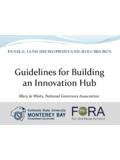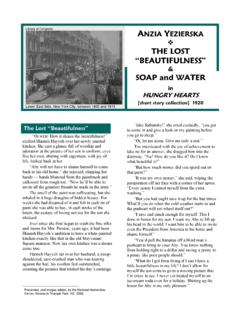Transcription of Why Addicts/Alcoholics Don’t Get Better Immediately: Post ...
1 Why Addicts/Alcoholics Don't Get Better Immediately: post - acute withdrawal syndrome (PAWS). Note: This material was developed from Relapse Prevention seminars hosted by Terence Gorski, MS. I recommend his Staying Sober and its accompanying workbook for anyone interested in following the subject further. Many of the problems associated with early sobriety do not stem directly from drugs and alcohol. Instead, they are associated with physical and psychological changes that occur after the chemicals have left the body. When alcoholics/addicts use, their brains actually undergo a physical change to cope with the presence of the drug in the body. When the drugs are removed, the brain then demands more to satisfy the desire caused by the changes. The extreme symptoms that are experienced immediately after the using has stopped is called acute withdrawal .
2 acute withdrawal , unfortunately, is not the whole story. The body makes initial adjustments to the absence of the drug, and the major symptoms ease up. However, the changes that have occurred in the brain needs time to revert back to its original state (to the extent that it can). During the period of time while this is occurring, comes a variety of problems known as post acute withdrawal syndrome (PAWS). All addicts and alcoholics suffer from damage to their bodies and nervous systems from drug/alcohol use, accidents, and malnutrition. They may also suffer from chronic diseases such as diabetes and hepatitis, and can usually bring to early recovery a broad array of other problems. As one alcoholic put it, When I got sober, things didn't get any easier, but they got real ing clear! . Recovery causes a great deal of stress. Many addicts and alcoholics never learn to manage stress without alcohol or drug use, or do so only after many attempts at sobriety.
3 The ability to deal with it depends on willingness to take care of themselves and maintain a healthy physical, emotional and spiritual lifestyle. Repairing the damage to the nervous systems usually requires from six months to two years with a healthy program of recovery. PAWS is the cause of most relapses in early recovery. Symptoms PAWS symptoms reach a peak from three to six months after the body is clean from all alcohol and / or drugs. Any use of drugs or alcohol, even in small quantities or for a short time, will effectively eliminate any improvement gained over that time, as it will keep the brain from healing. There are a variety of symptoms. Not everyone will experience all of them. Here are some of the main ones. Inability to solve problems Inability to solve problems leads to lowered self-esteem. The recovering person feels embarrassed, incompetent, and not okay.
4 Diminished self-esteem and fear of failure lead to living and working problems. These all add to stress, and the stress further exaggerates the other problems. Six things contribute to this: trouble thinking clearly, emotional overreaction, memory problems, sleep disturbances, physical coordination problems and difficulty managing stress. Inability to think clearly During the first two years of sobriety, the brain seems to work properly only part of the time. Sometimes the head just feels fuzzy because of the changes that occurred in the brains while they were using. The changes take time to improve. It is also due to the simple fact that they are trying to process a lot more information than they did before. While using, they mainly thought about getting more, using, and turning off their brains. Now they are considering the insurmountable number of things necessary to truly live life.
5 To begin with, it can be a bit much. Inability to concentrate Abstract reasoning suffers, and as stated above, the mind, like a confused cowboy, jumping on its horse and riding off in all directions. Rigid, repetitive thinking Thoughts go around and around in their heads, and they are unable to put them into useful order. They have not yet developed the ability to channel their thoughts and concentrate on one thing at a time. Memory problems The alcoholic/addict may hear something, understand it, and 20 minutes later it's gone! This sort of thing complicates their lives in many ways. It upsets supervisors, annoys significant others, and makes them wonder if they're losing their minds. With memory problems it is hard to learn new skills and absorb new information. We learn by building on what we have already learned, and memory difficulties can make it very difficult (if not impossible) to do that.
6 Again, these difficulties add to stress, especially if we do not understand what's happening to us. We may think, This sucks! I might as well be high.. Emotional overreaction or numbness People with emotional problems in early sobriety tend to over-react. When this overreaction puts more stress on our nervous systems than we can handle, we react by shutting down our emotions. We become emotionally numb, unable to feel anything. We may swing from one mood to another. These mood swings may baffle us, seeming to come without any reason, and may even be misdiagnosed as bipolar disorder. If we have developed insulin resistance or diabetes as a result of our drugs and drinking, this can become extreme. (See below). Sleep disturbances Disturbed sleep is common in recovery. It may last only a short time, or a lifetime. Often, this depends on what we consider to be a problem.
7 If we are night owls who used alcohol or pills to get to sleep in the daytime, we may discover that the only solution is to make significant changes in our schedule, and perhaps even in our occupations. Sleep deprivation stresses the body, prevents our minds from working well, and generally exaggerates any other difficulties we may be experiencing. We may experience changes in our sleep patterns, sleeping for long periods at a time, or getting sleepy at different times of the day. Although these may persist, we are usually able to adjust to them. The important thing is to be willing to adjust. We may not be able to keep to our old sleeping habits. Stress Difficulty managing stress is the most difficult part of post acute withdrawal , and of early recovery in general. Early on, we may not be able to distinguish between low and high stress situations, because for so many years we managed stress by using mood-altering substances.
8 Worst of all, the other PAWS symptoms become worse when we are under stress, and this causes the stress to increase! There is a direct relationship between elevated stress and the severity of PAWS. Each amplifies the other. At times of low stress, the symptoms of post acute withdrawal may lessen or even go away completely. When we are well-rested, relaxed, eating properly and getting along well with others, we seem to be fine. It is easy to see how we can get careless at these times, and many a relapse has occurred when things seemed to be going just fine. Abstinence Recovery from the damage caused by our addictions requires total abstinence. Abstinence means avoiding drugs and alcohol completely, unless we are under the care of a physician who understands both addictive disease and pharmacology. This specifically includes herbal remedies which, in many cases, are just as powerful and dangerous as prescription drugs.
9 Understanding and recognizing PAWS symptoms Because we are addicts and alcoholics, and because repeated relapses will eventually be fatal, we must realize that understanding PAWS is, literally, a matter of life and death. It is absolutely essential that we gain an understanding of post acute withdrawal , be able to recognize its symptoms when they appear, and know what to do about them. We must understand these things well enough that we are able to put them into effect even during periods when our addict instincts are telling us that we don't want or need to! We need also to learn about PAWS, and means of controlling it, when our stress levels are low, in order to be able to prevent the symptoms or be able to recognize and manage them if they occur. Stabilizing our episodes of PAWS. When we begin to experience PAWS, we need to bring it under control as soon as possible.
10 Here are five steps that can help. Talk! We need to talk about what's happening, to people who will listen and not criticize us. In addition to badly needed support, it helps us to clarify our feelings, look at them more realistically, and helps us recognize our symptoms. When we are in our own heads, our thoughts just go around and around. When we force ourselves to tell someone else, we often find that it puts them into order and they begin to make sense. Ventilate! We need to express as much as we can about what we are feeling, even if we think it sounds dumb or irrational. Get a reality check! We need to ask someone if we are making sense not just in what we're saying, but also our behavior. We must be sure our perception of what is happening matches up with reality. Set a goal What can we do right now to improve our situation? Taking action and changing things is our choice.









